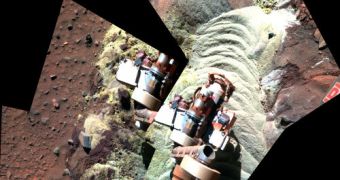The two exploration robots that make up the NASA Mars Exploration Rovers (MER) mission have started the eight year of their stay on the Red Planet today, January 4. While Spirit turns 7 today, its twin Opportunity will reach the mission milestone on January 25.
The former rover has been in a state called a safe mode for the past nine months, and NASA experts believe it's about time for it to resurrect, and resume its science mission.
Since May 1 2009, the rover has been trapped in a patch of loose soil called Troy, which stopped Spirit as it was heading towards a landscape feature called Home Plate.
As engineers have been unable to clear the obstacle after 8 months of failed attempts, mission controllers at the NASA Jet Propulsion Laboratory (JPL), in Pasadena, California, had to declare the rover a stationary science platform, and abandon all efforts.
They then proceeded to prepare the robot for winter, getting ready to shut it down until the next Martian spring, which is currently in full swing. The JPL team really hoped to be able to resurrect the rover before today's anniversary of its January 4, 2004, landing.
But hopes of reviving Spirit are not as high as during the last years. The machine is in a really tough spot, which does not benefit from a lot of sunlight, and which has a bad inclination towards the Sun.
“The reality that we haven't heard from the rover so far, now that we're in Martian spring, it's concerning,” explains JPL MER mission manager John Callas.
“And then each day that goes by, it's one more tick downward in our optimism for the rover,” he says in an interview for Space. But, even if the instrument is not resurrected, the fact of the matter remains that it exceeded its warranty many times over, as did Opportunity.
Both instruments were originally scheduled to roam the Martian landscape for as much as 90 sols, or Martian days, the equivalent of three Earth months. However, both managed to endure for years on end, completing tasks that would otherwise have required several separate missions.
But experts are not ready to give up on Spirit just yet. “It's total guesswork. People who've bet against it have always lost so far. But it's your great granddad of rovers,” says Ray Arvidson
The Washington University in St. Louis expert is the MER deputy principal investigator. He says that, if the rover is unresponsive in the coming months, then signals from its radio antenna will be used to assess the size of the Martian core.
Even after being frozen on Mars, the spacecraft will be useful, the JPL team says. However, experts are now focusing their efforts on reviving the robot, and are checking its progress daily.
“These rovers have demonstrated that there's always an exciting adventure ahead,” Callas explains.

 14 DAY TRIAL //
14 DAY TRIAL //